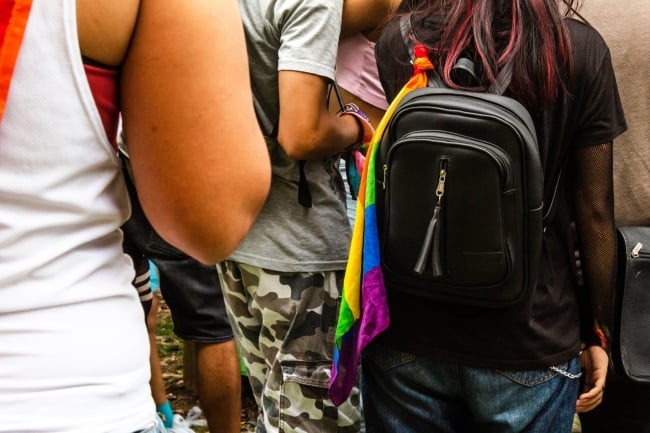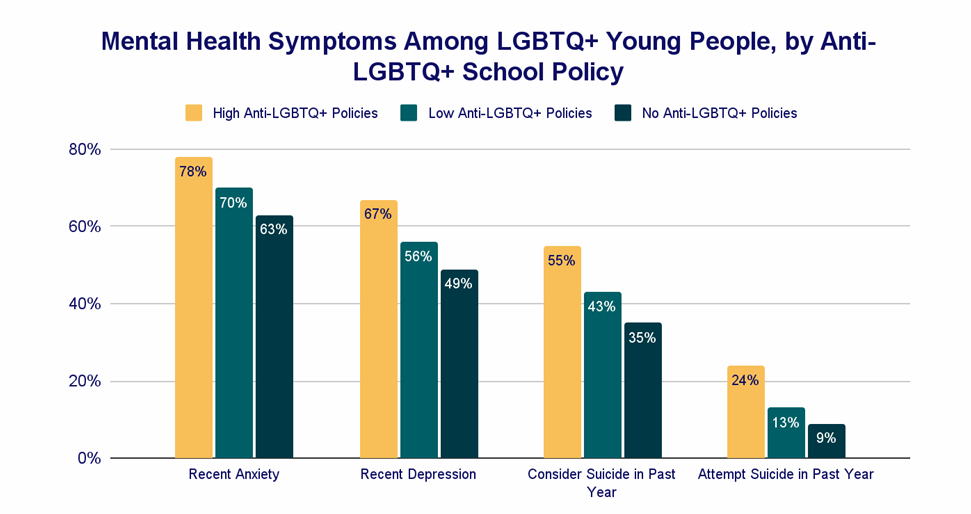You have /5 articles left.
Sign up for a free account or log in.

Young people in the LGBTQ+ community who attend schools with anti-LGBTQ+ practices are more likely to attend class less frequently or report mental health concerns.
Anderson Arboleda/iStock/Getty Images Plus
Anti-LGBTQ+ school policies, in addition to harming students’ feelings of belonging at their institution, may also have consequences for students’ mental health, according to new research from the Trevor Project.
Using survey data, researchers found LGBTQ+ students who reported experiencing anti-LGBTQ+ practices or policies were more likely to report feeling anxious, depressed or suicidal, compared to their peers who did not experience anti-LGBTQ+ practices at their institution.
The findings point to a need for continued support for LGBTQ+ students in schools and how inclusive policies support mental health and well-being.
Methodology: The report draws on data from the Trevor Project’s 2024 U.S. National Survey of the Mental Health of LGBTQ+ Young People, which included 18,663 young people between the ages of 13 and 24.
Around 78 percent of respondents were enrolled in school at the time of the survey administration in fall 2023.
To identify if students’ schools had anti-LGBTQ+ policies, students were asked if they had experienced any of the following from list of policies or practices, which included those that prevented someone “from using your chosen name and pronouns,” “disciplined for public affection that is not disciplined if it does not involve LGBTQ students” or “prevented from discussing or writing about LGBTQ topics in extracurricular activities.” Students who responded yes to at least one practice were included.
State of play: Just under 30 percent of young people said they were enrolled at a school with at least one anti-LGBTQ+ policy. Among respondents ages 18 to 24, 16 percent said they were at an institution with at least one anti-LGBTQ+ policy.
Transgender and nonbinary youth were more likely to say their institution had at least one anti-LGBTQ+ policy compared to those who are cisgender, which could point to a higher awareness of the barriers present for these students or policies that target these learners, according to the report.
Students enrolled at institutions that have at least one anti-LGBTQ+ policy were more likely to say they were attending school “sometimes” (44 percent), compared to their peers who reported attending a school with no anti-LGBTQ+ policies (38 percent), showing a correlation between anti-LGBTQ+ policies and attendance. Previous research found that LGBTQ+ learners with a high rate of anti-LGBTQ+ victimization report higher rates of truancy, compared to their LGBTQ+ peers who do not.
“Our finding may reflect the impact of anti-LGBTQ+ policies, with LGBTQ+ students having fewer protections against victimization, feeling less comfortable at school, and attending less often, or experiencing higher rates of discipline from school administration due to their LGBTQ+ identity,” the report authors wrote.
Students’ perception of anti-LGBTQ+ policies at their college or university varied by their institution type. Half of students in a dual- or concurrent-enrollment program said their institution had at least one anti-LGBTQ+ policy, too, but whether students were referring to their high school, the college or both is unclear.
Thirty percent of students enrolled in community colleges said their institution had at least one anti-LGBTQ+ policy, and 47 percent of students at technical school said their institution had at least one anti-LGBTQ+ policy. Among four-year and graduate school students, one-quarter said their institution had such a policy.
Across all young people, those at religiously affiliated institutions were more likely to report anti-LGBTQ+ practices (64 percent).
So what? LGBTQ+ students enrolled at schools with these kinds of practices were more likely to say they experienced verbal harassment due to their identity, physical attacks, unwanted sexual contact, discipline for fighting back against bullies or they left school entirely due to anti-LGBTQ+ mistreatment, compared to their peers who did not report anti-LGBTQ+ policies.
Campus infrastructure was also less likely to be inclusive to LGBTQ+ students if students reported anti-LGBTQ practices. Compared to their peers, students were less likely to have access to a Gay-Straight Alliance (49 percent versus 68 percent) or gender-neutral bathrooms (30 percent versus 48 percent).
Attending a school with anti-LGBTQ+ policies was associated with worse mental health and higher suicide risk among LGBTQ+ young people, as well. Those attending schools with noninclusive policies had higher rates of anxiety, recent depression, seriously considering suicide in the past year or attempting suicide in the past year. Poor mental health responses also grew with the number of anti-LGBTQ+ policies students said were present at their schools.

Students who attended schools with more reported anti-LGBTQ+ policies were more likely to demonstrate symptoms of poor mental health.
The Trevor Project
Report authors suggest these findings have implications for people who work with young people to advocate for LGBTQ+ students in their educational settings. “LGBTQ+ students deserve the right to feel safe in school, to openly discuss their LGBTQ+ identity with peers and adults without fear of being outed to potentially unsupportive families, and to see themselves reflected in school curricula,” they wrote.
Do you have a wellness tip that might help others encourage student success? Tell us about it.




